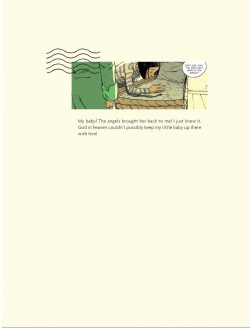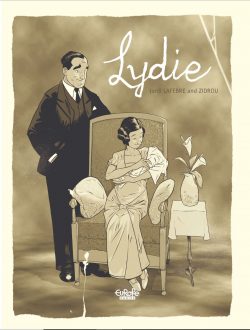

By Zidrou & Jordi Lafebre, translated by Mercedes Claire Gilliom (Europe Comics)
No ISBN: digital edition only
Win’s Christmas Gift Recommendation: Lyrical, Lovely, Unforgettable… 10/10
It’s the season for spirits and spectres and we all love a good, healthy scare, but it’s wise to remember that ghost stories aren’t just about revenge, unfinished business or unreasoning irrational terror. So often, what’s at play is feeling of duty and ineffable loss…
As you’d expect, our Continental cousins are exceeding adept at exploring humanity’s softer sides through the medium of comics, and Lydie is a masterclass in emotive, evocative, ruthlessly sensitive storytelling to delight our senses by quietly affirming our better natures.
Be warned though: this tale is funny, heartwarming and sad. No one (at least nobody even borderline human) will scoff or sneer if you need tissues to get you to the end.
Lydie was originally released in 2012, courtesy of empathetically enthralling scripter Zidrou (Benoît Drousie) and illustrator Jordi Lafebre. Drousie is Belgian, Brussels born in 1962 and until 1990 a school teacher – prior to quitting marking books to instead make them. His primary successes include school dunce series L’Elève Ducobu, Petit Dagobert, Scott Zombi, La Ribambelle, Le Montreur d’histoires, African Trilogy, Shi, Léonardo, a revived Ric Hochet and so many more. His most celebrated and beloved stories are the Les Beaux Étés sequence (translated by Europe Comics as Glorious Summers) – and this stand-alone saga. Both are illustrated by Spanish artist Jordi Lafebre.
The sublimely gifted illustrator and art teacher was born in Barcelona in 1979 and has been a comics professional since 2001 – initially for magazines like Mister K, where he limned Toni Font’s El Mundo de Judy. Lafebre found regular work at Le Journal de Spirou, creating the romance Always Never and collaborating with Zidrou on La vieille dame qui n’avait jamais joué au tennis et autres nouvelles qui font du bien, and La Mondaine.
Even for such gifted creators and in-tune collaborators, Lydie is something special: A combination of semi-tragic feel-good fable and genteel working class ghost story, this is a beguiling confection dealing out potent emotional punches one after another – so be braced with plenty of hankies. Nevertheless, it still manages to find the good and the laudable in us, even in the lowest moments and worst of aspects of our natures: enrobing what should be crushing tragedy in the uplifting actions of a community looking out for all of its members, no matter how flawed or forgotten they might become…
It starts sometime in the last century with a little enclave of an ordinary district in the kind of town that used to be everywhere. The crowded cul-de-sac of Baron Van Dick Court is a tiny, independent world of its own, where everyone knows everyone – and most of their personal business. However, since kids will be kids, when a little bit of mischief occurred, the place became irrevocably and foreverafter “Mustachioed Baby Court”…
The denizens live piled up on each other and are a typical bunch: hard-working, industrious, painfully practical and all eking out a living as best they can, but one night something rather extraordinary happens…
It truly started some time earlier. Down in the backyard, poor, hard-up Victor Lefort was again forced to destroy his cat’s beautiful kittens, even as upstairs Doctor “Fables” Fabian was failing to save a baby. Perhaps it was for the best. Distressed mother-to-be Camille Tirion is painfully simpleminded, and had been cruelly taken advantage of by some vile anonymous sinner, so what possibly life could her child have had?
Camille – and her poor father Augustin – were subject of much gossip in the local general store/bar. Despite being a train driver and often away overnight, he has done his best raising his afflicted daughter all on his own… at least until this…
Camille’s mother also died in childbirth and now cruel fate has struck the family again…
The event affects everyone in the Court and many parents must explain to their own children how – if not why – Camille’s baby has gone and must live in a tiny wooden box under the ground in the church graveyard…
However, once all the necessary ceremonies have taken place and life in the Court moves back towards normal, something happens. It begins when Augustin finds his bereft child crumpled under the little statue of the Madonna that’s been overlooking the court for who knows how long, and continues the next day when Camille dashes joyously into the store, ecstatically telling all inside that her baby has come back.
Of course, little Lydie is invisible now…
Her joy is infectious, and no one wants to disabuse the poor simpleton of her fanciful notion, but things take a stranger turn after the feral and prolific delinquent Ayhard brothers brutally tease the “new mother “and her swaddled, intangible infant. When aged Madame Paris helps distraught Camille comfort the latest addition to the Court, the community rallies around, and before long even the most curmudgeonly dweller in Mustachioed Baby Court is playing along: from crusty shopkeeper Théophile Lefort to acid-tongued sot Madame Malisse. The priest is even cajoled into performing a special baptism for the unseen infant…
…And gradually, with everyone contributing to the fantastic lie for decades, it all seems to come fantastically true…
From this point on, the story takes on a life of its own too, so please for the sake of soul and all the lost joy modern life has stripped from you, find and read this glorious fable dedicated to the miraculous strength of imagination, power of love and irresistible force of humanity united in a grand cause…
© 2018 DARGAUD BENELUX (Dargaud-Lombard s.a.) – Jordi Lafebre and Zidrou. All rights reserved.
